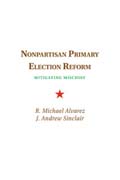
Nonpartisan Primary Election Reform: Mitigating Mischief
Alvarez, R. Michael
Sinclair, J. Andrew
Over the years, observers of American politics have noted the deleterious effects of party polarization in both the national and state legislatures. Reformers have tried to address this problem by changing primary election laws. A theory underlies these legal changes: the reformers tend to believe that 'more open' primary laws will produce more centrist, moderate, or pragmatic candidates. The 'top-two' primary, just implemented in California, represents the future of these antiparty efforts. Nonpartisan Primary Election Reform examines California's first use of the top-two primary system in 2012. R. Michael Alvarez and J. Andrew Sinclair evaluate the primary from a variety of perspectives and using several different methodologies. Although the first use of this primary system in California did not immediately reshape the state's politics, it also did not have many of the deleterious consequences that some observers had feared. This study provides the foundation for future studies of state primary systems. INDICE: 1. A problem posed in Tampa; 2. Primary expectations; 3. The year and the proposition; 4. What happened in 2012?: legislative elections; 5. Primary elections and voter participation; 6. The voter's view; 7. Abandonment of weak parties; 8. Voter expectations for California's top-two primary; 9. Voting rights, representation, and the top-two primary; 10. Beyond the spatial model; 11. Conclusion.
- ISBN: 978-1-107-69015-8
- Editorial: Cambridge University Press
- Encuadernacion: Rústica
- Páginas: 224
- Fecha Publicación: 26/11/2015
- Nº Volúmenes: 1
- Idioma: Inglés
